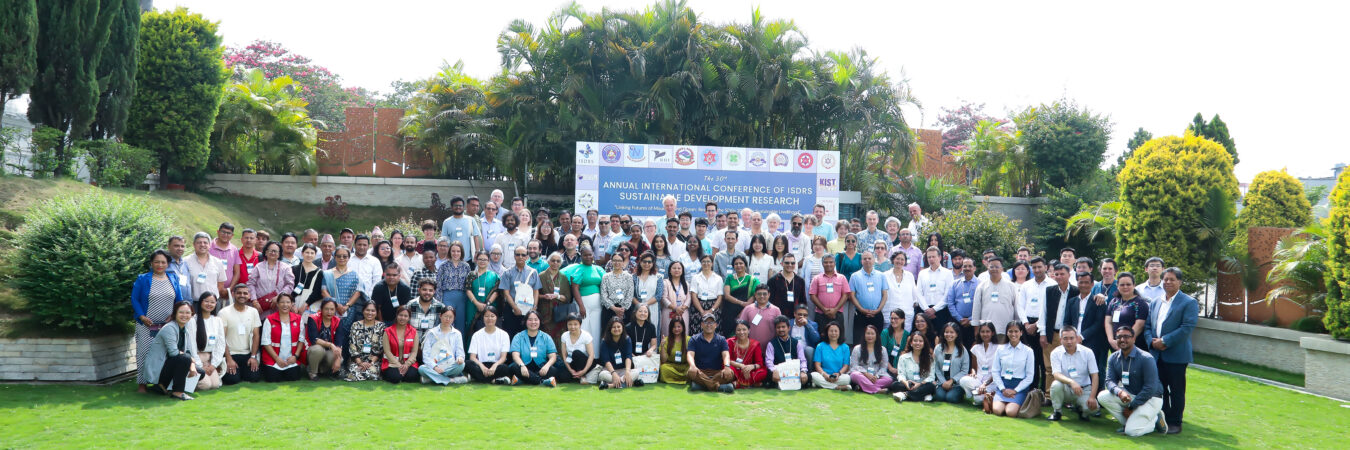
ANSAB’s experience and knowledge featured at ISDRS Conference in Kathmandu
Kathmandu, Nepal – June 25, 2024
The 30th Annual International Conference of the International Sustainable Development Research Society (ISDRS) took place in Kathmandu, Nepal from June 10-14, 2024. Hosted by Mid-West University and Nepal Open University, and Resources Himalaya Foundation serving as conference secretariat, the conference provided a global platform for participants to share efforts and accomplishments towards achieving the Sustainable Development Goals (SDGs) by 2030. 264 researchers, academicians, scholars, practitioners and policy makers from 47 countries participated the conference.
 One of the highlights of the conference was a session organized by ANSAB titled “Biodiversity and Beyond: Experience and Lessons on Community-based Forest Management”. Held on June 13, 2024, this session involved over 80 participants. Mr. Puspa Lal Ghimire, Programs Director and Mr. Sudarshan Khanal, Research, Planning and Communication Manager presented ANSAB’s three decades long experience and learnings in community-based biodiversity conservation and rural livelihood enhancement. Emphasizing participatory action research, the presentation showcased how ANSAB’s practical solutions have brought significant environmental, economic, and social benefits while fostering an enabling policy environment. ANSAB’s efforts have brought over 150,000 hectares of forests and meadows under improved community management, developed and strengthened more than 1,300 economic entities, involving over 85,000 economic participants generating over USD 9 million in annual monetary benefits.
One of the highlights of the conference was a session organized by ANSAB titled “Biodiversity and Beyond: Experience and Lessons on Community-based Forest Management”. Held on June 13, 2024, this session involved over 80 participants. Mr. Puspa Lal Ghimire, Programs Director and Mr. Sudarshan Khanal, Research, Planning and Communication Manager presented ANSAB’s three decades long experience and learnings in community-based biodiversity conservation and rural livelihood enhancement. Emphasizing participatory action research, the presentation showcased how ANSAB’s practical solutions have brought significant environmental, economic, and social benefits while fostering an enabling policy environment. ANSAB’s efforts have brought over 150,000 hectares of forests and meadows under improved community management, developed and strengthened more than 1,300 economic entities, involving over 85,000 economic participants generating over USD 9 million in annual monetary benefits.
A key focus of the session was the UK Government Darwin Initiative-funded project “Himalayan Plants for People: Sustainable Trade for Biodiversity and Development,” implemented by ANSAB and TRAFFIC International in partnership with other partners. This project, initiated in 2018, is being carried out in three phases. The first phase, started in 2018, covered two districts, one plant species, 10,000 hectares of forest area, and benefited 2,000 harvesters. The second phase expanded to five districts, five plant species, 33,000 hectares of forest, and 5,000 harvesters in 2021. The current phase has recently begun in 2024 and aims to cover 27 districts, 10 plant species, 110,000 hectares of forest area, and benefit 15,000 harvesters, with plans or regional level activities involving India and China for better market integration. This project enhanced sustainable NTFP management by developing management plans of community forests, training harvesters, and upgrading community level processing facilities. Additionally, it established fair trade structures, facilitated FairWild certification, and promoted market access, including to China through dialogues between government and Traditional Chinese Medicine (TCM) companies, alongside facilitating amendment of the CITES Act and development of CITES regulations.
During the session, participants actively engaged in a lively discussion, expressing their appreciation for the community-based, incentive-oriented conservation approach and its positive results. This highlighted the effectiveness and efficiency of community-based forest management in tackling biodiversity conservation threats. Additionally, participants examined how this approach could address current issues like forest fires, human-wildlife conflicts, and the outmigration of rural youth. Dr. Dipesh Pyakurel, ANSAB’s Senior Manager – Biodiversity facilitated the session.
